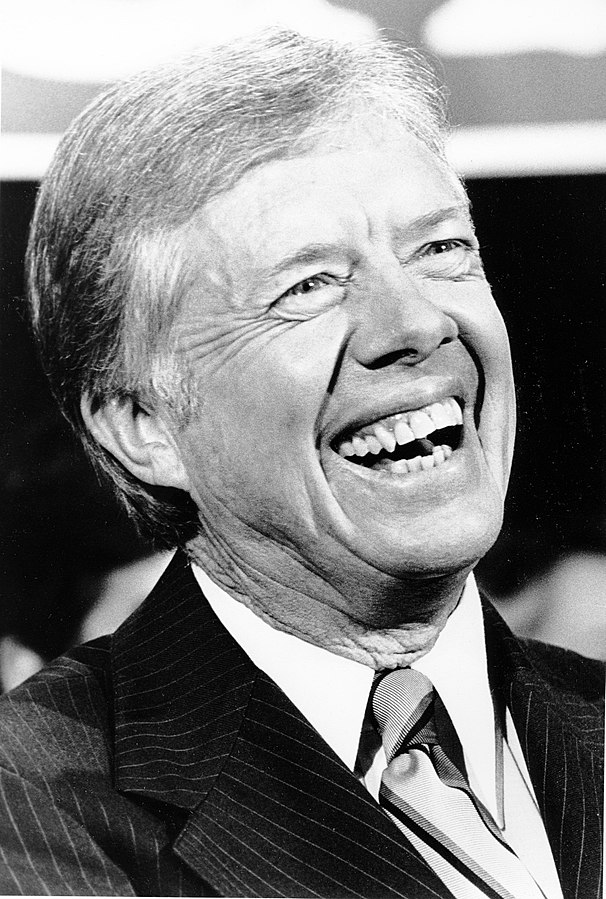You never quite know when history will be made. Whether the moment is loud or quiet is never quite revealed until the event itself. So, when the future was born along with James “Jimmy” Carter on Oct. 1, 1924 in the small town of Plains, Georgia, no one quite knew the effect such an individual would have on the lives of his family, country, and world. Even when Carter passed on Dec. 29, 2024 at age 100, his legacy remained strong as ever.
Carter led a pleasant, yet humble, childhood. His mother, Lillian Gordy Carter, was a nurse and his father, James Earl Carter Sr, was a businessman and farmer. He was educated in the Plains’ public school system, Georgia Southwestern College, and the Georgia Institute of Technology, and later earned a Bachelor of Science degree from the US Naval Academy in 1946.
While serving in the military, he held the role of a submariner in the Navy. Eventually promoted to lieutenant and later selected for a nuclear submarine program, he completed graduate work in nuclear physics and reactor technology at Union College. Eventually, Carter became a senior officer on the second nuclear submarine, the Seawolf.
Carter married Rosalynn Smith on July 7, 1946, who was also from Plains. Unfortunately, in 1953, his father’s death triggered him to leave the Navy and return home. Carter began to operate the family businesses of Carter Farms and Carter’s Warehouse with his wife.
Back in Georgia, he became prominent in the community, holding a variety of local roles. These positions increased his popularity, allowing Carter to be elected to the Senate in 1962. Eventually, he earned the role of governor in 1971.
Striving for more, Carter revealed that he would run for president on Dec. 12, 1974, drawing great support and leading to a democratic nomination two years later. Running against Republican Gerald Ford, the campaign trail was a long process. Despite his competition, Carter won the election with an electoral victory of 297 to 241 on Nov. 2, 1976. He was inaugurated as the 39th President of the United States on Jan. 20 of the following year.
Carter served one term, lasting from 1977 to 1981. Despite losing the following presidential election to Republican Ronald Regan, his accomplishments were numerous. For example, he mediated in the Camp David Accord — uniting Egypt and Israel in a peace treaty — and signed the Panama Canal treaties, an agreement that accelerated international trade by sharing control of the canal with Panama.
Additionally, Carter aimed to increase human rights worldwide, while also advocating for sustainable development and energy. This became especially apparent through his creation of a new energy plan, in the form of the Department of Energy. Through passing the Alaska National Interest Lands Conservation Act, a large focus was brought to preserving lands and resources. In the end, Carter had an immense impact as a green and environmentally friendly leader
Lastly, another imperative accomplishment was Carter’s creation of the Department of Education. Made in 1979, this department prioritized new initiatives related to equality in education and corrections in long standing inequities. Carter found that education emphasis was largely diminished in the federal government, so through centralizing the system, more attention was brought to such an issue.
During and following his presidency, Carter wrote 32 books, including Living Faith and White House Diary.
Even following his time in office, he continued to play a role in social justice, creating the Carter Center in 1982 with Rosalynn. This organization aimed to address issues of public policy, while also placing emphasis on human rights, democracy, and disease prevention. Additionally, Carter has aided in mediation of foreign circumstances in the Middle East, North Korea, and more.
On December 10, 2002, Carter was awarded the Nobel Peace Prize, due to his dedication to preventing international conflict, focus on democracy, and fight for human rights.
Carter entered hospice on Feb. 18, 2023, deciding to spend the remainder of his life in the comfort of his own home with his countless children and grandchildren. Rosalynn passed on Nov. 19, 2023 and, a year later, Carter passed on Dec. 29, 2024.
Despite his death, Carter’s legacy remains stronger than ever. His focus on widespread peace and equality had a valuable impact on society. Carter’s focus on democracy, and its role in helping governments and societies thrive still drives deep to the heart of the US today. Human rights and individual freedoms were long sought after, and such battles are still fought. However, Carter’s actions as president, and even following his term, have played a large role in driving along a fight for justice. That is perhaps the most powerful legacy of all.



